| 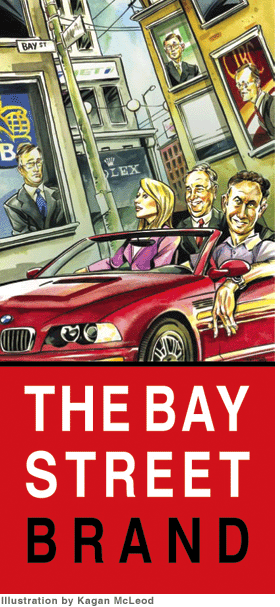 Our
poll finds a scandalous issue, a golden-child
company, some favourite toys, but
no one big hero to worship in the
most mythical of places in Canadian
business. Our
poll finds a scandalous issue, a golden-child
company, some favourite toys, but
no one big hero to worship in the
most mythical of places in Canadian
business.
By Andre Mayer
What's Bay Street thinking?
It's a question that occupies investors
and observers, but in a survey conducted
exclusively for The Bull,
the street has spoken to us directly.
National polling agency COMPAS Inc.
asked 571 chief executive officers
and business leaders from across Canada
to answer a host of questions about
"Bay Street." The results*
provide an intriguing snapshot of
what "making it" in Canadian
business looks like in 2004, as well
as of what those who have made it
have on their minds.
THE PLACE: Literally
speaking, Bay Street is a north-south-running
street that cuts a swath through downtown
Toronto's most imposing office towers.
According to our survey, however,
what pops into the minds of Canadian
business leaders when they hear "Bay
Street" is a place of metaphorical
or perhaps even mythical proportions
called success.
In fact, few business leaders give
much consideration to Bay Street's
geographic co-ordinates. 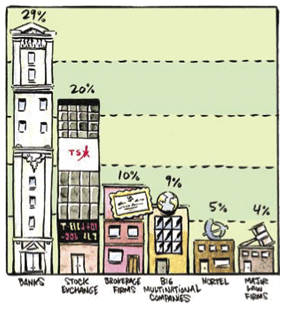 When
asked what it meant to be a "Bay
Street Company," only nine percent
of respondents said a firm actually
"located on Bay Street."
Nineteen percent said that a "Bay
Street company" was any "major
corporation located in Canada."
Another 14 percent averred that it
was a "major financial services
company in Canada." When
asked what it meant to be a "Bay
Street Company," only nine percent
of respondents said a firm actually
"located on Bay Street."
Nineteen percent said that a "Bay
Street company" was any "major
corporation located in Canada."
Another 14 percent averred that it
was a "major financial services
company in Canada."
So what's the makeup
of Bay Street proper? Well, take a
walk down Bay, past the Canada Trust
Tower, the Toronto-Dominion Bank Tower
and the Royal Bank Plaza, and draw
your own conclusions. It's banking
heaven. When asked to name the type
of business most readily associated
with Bay Street, 29 percent of our
respondents chose the banks. Another
20 percent proffered the stock exchange
and another 10 percent said brokerage
firms.
THE PLAYERS: The most
obvious finding of our poll was this:
Bay Street has no heroes. Sure, there
are people who embody business success,
but for the most part, there's no
cult of personality. When Canada's
leading executives were asked by COMPAS
to name the person who most personifies
Bay Street success, takeover king
Gerry Schwartz, a.k.a. Mr. Heather
Reisman, finished first, with a mere
12 percent. The president of Onex
Corp. has orchestrated some pretty
stunning deals, but these numbers
don't suggest a landslide of popularity.
Chalk it up to Canadian reserve, but
corporate Canada doesn't seem to lionize
its business leaders the way Americans
do. We would never think of giving
Schwartz his own reality-TV show.
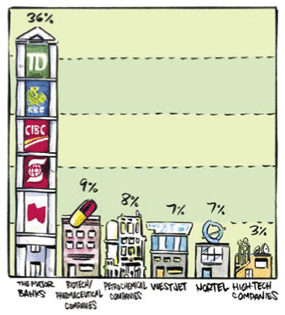
After Schwartz, respondents picked
a bevy of bankers: CIBC's John Hunkin,
TD's W. Edmund Clark (four percent
each), RBC's Gordon Nixon and Scotiabank's
Richard Waugh (three percent each),
followed by Manulife Financial Corp.'s
Dominic D'Alessandro (three percent).
Why did they rate so high? Sure, they're
well-paid presidents and chief executives
of widely held companies, but they're
not worth a fraction of some of the
people lower down the list (like Belinda
Stronach, Paul Desmarais and Canada's
wealthiest man, Ken Thomson). A survey
of Wall Street would probably turn
up very few bankers, but their inclusion
here seems to say something very revealing
about success in Canadian business.
If you head a bank, you're a player.
Average Canadians might not recognize
your name, but Bay Street sure does.
The explanation is simple: banks hold
our money, and the number of major
Canadian banks is few (getting fewer
all the time). Bank presidents wield
enormous power, not only over average
citizens but the corporate elite as
well.
Scroll down the list
and you come across names like disgraced
press baron Conrad Black and Prime
Minister Paul Martin (two percent
each). Martin made a very public show
of breaking from his business when
he put control of Canada Steamship
Lines in the hands of his sons, but
he still appears to be recognized
by corporate Canada as one of its
own. For a politician, he commands
a substantial amount of sway. A couple
of wealthy American interlopers (Bill
Gates and Donald Trump) also charted
on our poll. With Trump International
Hotel & Tower — a 68-storey
edifice at 325 Bay St. that might
just be big enough to house The Donald's
ego — slated for completion
in 2008, the real-estate mogul with
the billowy coif appears to have established
a beachhead in Canadian business.
While some wonder if he can pull it
off, Trump has told The Bull
he likes his odds in the Toronto market.
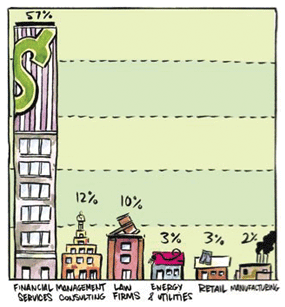 THE LIFESTYLE: So
you've made it on Bay Street. You've
got your TSX listing, you've got your
swishy office in First Canadian Place.
Bravo. Now that you've reached this
new profit plateau, you need to let
everybody know. So how do you go about
flaunting your success? With luxury
items, bien sur, like a brazenly
lustrous timepiece or a slick, overpriced
automobile to inspire awe and resentment
on city streets. Hey, it don't mean
a thing if it ain't got that bling.
Rolex is Bay Street's most coveted
watch (53 percent of respondents),
with the next well-known Cartier garnering
eight percent. When choosing its favourite
ride, the Street has a soft spot German
engineering, with BMW placing first
(with 27 percent), followed by Mercedes
(22 percent). As for the Mazda3, Canada's
best-selling passenger vehicle, zero
percent named it as their dream car.
THE LIFESTYLE: So
you've made it on Bay Street. You've
got your TSX listing, you've got your
swishy office in First Canadian Place.
Bravo. Now that you've reached this
new profit plateau, you need to let
everybody know. So how do you go about
flaunting your success? With luxury
items, bien sur, like a brazenly
lustrous timepiece or a slick, overpriced
automobile to inspire awe and resentment
on city streets. Hey, it don't mean
a thing if it ain't got that bling.
Rolex is Bay Street's most coveted
watch (53 percent of respondents),
with the next well-known Cartier garnering
eight percent. When choosing its favourite
ride, the Street has a soft spot German
engineering, with BMW placing first
(with 27 percent), followed by Mercedes
(22 percent). As for the Mazda3, Canada's
best-selling passenger vehicle, zero
percent named it as their dream car.
THE TRIUMPHS AND
EMBARRASSMENTS: Like
any business hub, Bay Street is prone
to the peaks and valleys of the market.
According to 36 percent of business
leaders polled, the sector that best
represents a bullish market is the
banking industry. (Do you see a trend
here?) The 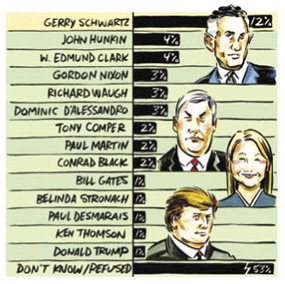 biotech/pharmaceutical
industry placed a remote second (with
nine percent), while a couple of individual
companies — golden-child Westjet
and beleaguered Nortel — each
got seven percent. biotech/pharmaceutical
industry placed a remote second (with
nine percent), while a couple of individual
companies — golden-child Westjet
and beleaguered Nortel — each
got seven percent.
Business scandals
have occupied newspaper headlines
for the past few years. When asked
to name the greatest-hits list of
Canadian corporate malfeasance, 35
percent of respondents pointed to
the Enron accounting fiasco and its
ties to CIBC. Bre-X, that once-sparkling
mineral play, also looms large in
Bay Street's psyche (25 percent).
The revelations at Hollinger and the
dramatic fall of Lord Black of Crossbarbour
— a drama that continues to
play out like a Greek tragedy, or
an Ealing comedy — garnered
only a few votes. 
*Note: this sample is deemed accurate
to within 4.1 percentage points, 19
times out of 20.
|